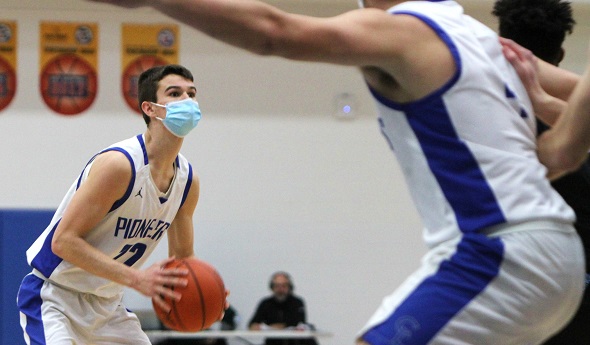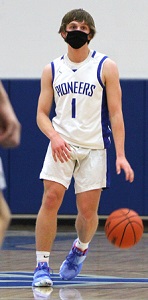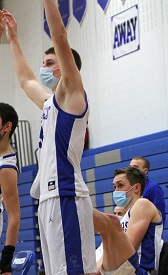
Detroit 'Longtime' Boys Coaches Down to Few
By
Tom Markowski
Special for Second Half
December 14, 2016
Gary Fralick considers himself one of the fortunate ones.
 Fralick, 66, is in his 32nd season as a head boys basketball coach. He retired from his teaching position in 2013. He started coaching at Redford Thurston in 1979, went to Royal Oak Kimball in 1984 and is in 23rd season as the head coach at Troy.
Fralick, 66, is in his 32nd season as a head boys basketball coach. He retired from his teaching position in 2013. He started coaching at Redford Thurston in 1979, went to Royal Oak Kimball in 1984 and is in 23rd season as the head coach at Troy.
Fralick might be lucky, but he is unquestionably rare. Fralick is believed to be one of three coaches in the Macomb/Oakland/Wayne area who has coached for more than 30 seasons.
There’s Dan Fife at Clarkston and Kevin Voss of Clinton Township Chippewa Valley, both of whom in their 35th seasons, all at the same school.
Another, Greg Esler at Warren DeLaSalle, is in his 30th season. He was the head coach at St. Clair Shores Lake Shore for seven seasons before going to DeLaSalle in 1994.
“We’re part of a dying breed,” Voss said.
It certainly appears so. Coaching longevity has taken on a different meaning recently. Twenty seems like a lot in these times, and in reality it is a long time. Twenty years or so ago, 20 years was normal. There’s a new normal, and 20 or 25 years isn’t it.
Many factors have contributed to this change. A person’s personal and family life often don’t coincide with the demands of coaching basketball. The responsibilities that come with coaching have increased. Some coaches say that to be an effective coach, it can be a 10- or 11-month job.
Two factors are at the forefront, and they are both financial. Coaches used to be educators as well as coaches. Yes, coaching can be viewed as teaching on the court, but at one time teaching in a classroom and coaching used to go hand in hand.
 Then there’s the subsidy coaches receive. It varies from school district to school district. Some make $4,000 a season, others can make $7,000. And it also costs money to run a program; unless the coach receives financial help from a booster club or parents, the money he or she receives begins to dwindle.
Then there’s the subsidy coaches receive. It varies from school district to school district. Some make $4,000 a season, others can make $7,000. And it also costs money to run a program; unless the coach receives financial help from a booster club or parents, the money he or she receives begins to dwindle.
But the most important factor is time.
“A tremendous amount of time is devoted to watching DVD or tapes,” Fralick said. “I know I’m dating myself with saying that. The point is, you’re watching a lot. There’s more scouting. And you don’t get paid much. Why don’t they stay as long as they used to? They get burned out. They want to spend more time with their families.
“You don’t see as many of the young coaches stay. Coaches don’t have the ambition to coach a long time. It’s not a profitable job. I don’t know what other coaches make. We used to compare what we made. Not anymore.
“Thirty years or more? I don’t see it happening. There’s the dual job thing. Things have changed. To me, it’s been a great job.”
To compensate for being away from home, Fralick brought his family with him. Sort of. He coached his son Gary, Jr., and Tim. Gary, a 1996 Troy graduate, played for his father his junior and senior seasons and Tim, a 1999 graduate, played four seasons on varsity. Fralick said he was even more fortunate to coach both on the same team (during the 1995-96 season).
Then there’s his wife, Sharon, who remains the scorekeeper.
“I’ve always had a passion for coaching and teaching,” Fralick said. “I love the game of basketball. I love the kids. There’s never a dull moment. It’s been a great ride.”
Vito Jordan has been around basketball all of his life. His father, Venias Jordan, was the boys head varsity coach at Detroit Mackenzie and Detroit Mumford before stepping down as a head coach only to return to the bench assisting his son the last six seasons.
Vito Jordan, 31, became a head coach at Detroit Osborn when he was 24. He started his coaching career the year before as an assistant to Henry Washington at Macomb College. Jordan went to Detroit Community after one season at Osborn and guided Community to its only MHSAA Finals appearance (Class B, 2013). He’s now in his fourth season as the head coach at Detroit Renaissance.
“I followed my father all of my life,” Jordan said. “I knew what I wanted to do when I was in college (Alma College). This is what I want to do the rest of my life.”
It’s different in Detroit. Schools close. Job titles change. Jordan, for instance, teaches at the Academy of Warren, a middle school in Detroit. It’s a charter school, not within the Detroit Public School system, therefore he receives his pay from two separate school systems (Renaissance is in the DPS).
There is a distinction. In some school systems coaches will receive a percentage – let’s say for argument sake, 10 percent – of their teaching salary to coach. Let’s say a person makes $60,000 a year to teach. He or she would then receive $6,000 to coach. If you coach two sports, that’s $12,000.
 Jordan is not privy to such a contract. Each job is separate. Jordan loves to coach, and he understands he must be a teacher to earn a decent living, and he’s content to continue on the path he is following. But he also knows that to make a good salary just coaching one must move on to the collegiate level like others have done.
Jordan is not privy to such a contract. Each job is separate. Jordan loves to coach, and he understands he must be a teacher to earn a decent living, and he’s content to continue on the path he is following. But he also knows that to make a good salary just coaching one must move on to the collegiate level like others have done.
“When there were coaches like my dad, Perry Watson (Detroit Southwestern), Johnny Goston (Detroit Pershing) and others, they all worked in the (Detroit Public) school system. Everyone was teaching. That was your career. None of them had aspirations of being a college coach. Not even Watson. Now everyone isn’t in the teaching profession. Maybe they do have a degree and maybe they don’t. The point is, most aren’t teachers. I can count on one hand those (in Detroit) who have their teaching certificate and coach.”
Jordan noted such successful PSL coaches like Derrick McDowell, Steve Hall and Robert Murphy who left high school to pursue a coaching career in college. Murphy guided Detroit Crockett to the Class B title in 2001 and is now the head coach at Eastern Michigan. McDowell has had two stints as a collegiate assistant coach, most recently at EMU. He’s since returned to coach at Detroit Western. Hall coached Detroit Rogers to three consecutive Class D titles (2003-05) before going to Duquesne University and Youngstown State as an assistant coach. Hall returned to Detroit last season and is in his second season as head coach at Detroit Cass Tech.
Jordan said they left high school to challenge themselves professionally, among other considerations. Voss said there are variables that influence how long a person lasts, in one school district or in coaching in general, that didn’t exist 20 years ago.
“Athletics have become pervasive in high school,” he said. “The whole booster situation you find in college is here. You can be winning but not winning enough. It’s a trickle down affect.
“Coaches complain about parents. Parents complain about playing time. High school sports is not as pure as it once was. Winning is way more important now. Now a coach comes in with a three-year window. You can have one or two down years, and the third you’d better win.
“Then there’s the pressure on your family. I’ve been lucky. My wife and I have had the players over for team dinners. We create a family atmosphere. It’s a change of society. I don’t envy the young coaches coming in.”
Community involvement has always been a priority for Voss. To keep a hand on the pulse, Voss heads the elementary basketball program within the Chippewa Valley school district. Games are held on Saturdays, and approximately 750 students take part.
“You have to have the right fit,” he said. “I’m in the right spot. You coach for different reasons when you get older. I’m enjoying the game. There’s a different level of satisfaction.”
 Tom Markowski is a columnist and directs website coverage for the State Champs! Sports Network. He previously covered primarily high school sports for the The Detroit News from 1984-2014, focusing on the Detroit area and contributing to statewide coverage of football and basketball. Contact him at [email protected] with story ideas for Oakland, Macomb and Wayne counties.
Tom Markowski is a columnist and directs website coverage for the State Champs! Sports Network. He previously covered primarily high school sports for the The Detroit News from 1984-2014, focusing on the Detroit area and contributing to statewide coverage of football and basketball. Contact him at [email protected] with story ideas for Oakland, Macomb and Wayne counties.
PHOTOS: (Top) Troy boys basketball coach Gary Fralick, left, is in his 32nd season coaching. (Middle) Detroit Renaissance boys coach Vito Jordan is following in the coaching footsteps of his father, Venias. (Below) Chippewa Valley boys coach Kevin Voss, left, is in his 35th season at his school. (Top and below photos courtesy of C&G Newspapers; middle photo courtesy of Detroit Public School League.)

Where's Cros-Lex? Among Hoops Best
By
Paul Costanzo
Special for MHSAA.com
February 16, 2021
Conversations about Croswell-Lexington basketball have long been common in Lance Campbell’s barbershop.
 Hearing them on the opposite side of the state, though, is something new.
Hearing them on the opposite side of the state, though, is something new.
“It’s nice to go on Twitter and have people talking about Cros-Lex,” said Campbell, the Cros-Lex boys coach whose full-time job is running Campbell’s Cuts in Croswell. “It hasn’t been something that’s happened. It’s nice to get the statewide attention. A friend of mine went to a showcase in Grand Rapids, and said he was sitting in the stands and people were like, ‘Who the (heck) is that Croswell whatever? Where the (heck) are they?’”
To answer the question: Cros-Lex is a few miles inland from Lake Huron in the southern half of the Thumb. But the folks on the west side were talking because they had already found Cros-Lex – near the top of the Division 2 boys basketball rankings.
The Pioneers were 20-1 a year ago, spending most of the season in the top five of the polls. They were ranked No. 25 in all divisions by MLive heading into the postseason and were picked by multiple writers and followers of the sport to make the school’s first run to the Breslin Center for the MHSAA Final Four.
The online chatter never had a chance to turn into more, as the season was ended prior to the District Final because of COVID-19. But with much of the team back, led by four-year standouts Hunter Soper and Tyler Johnson, the Pioneers are looking to prove all the talk was justified.
“Last year felt perfect,” Soper said. “It’s hard to think about it, and going to bed every night with a ‘What if?’ Everything felt like it was clicking for us. We’re trying to get back to that this year. We’re hoping to make a deep run again and not end on a ‘what if,’ but a ‘we won.’”
Campbell, a Cros-Lex graduate himself, won’t say outright that he saw this coming. But he also won’t say that he didn’t.
While he’s in his fourth year as varsity coach, he’s been coaching at some level in the program since the early 2000s, when his former coach Don Roberts asked him to come aboard. He watched the players who now make up his team grow up as athletes on the basketball court, baseball diamond and football field.

“Five or six years ago, we kind of looked and thought this could be a special class, but I’ve seen that happen multiple times and you never know how it will work out,” Campbell said. “When I was in eighth grade, I think four of the five starters didn’t even play basketball by the time we were on varsity. This senior class, Joey Noll was a role player, he was the eighth or ninth kid on the eighth-grade team, now he’s a starter. Two kids who started on that eighth-grade group aren’t playing anymore. We kind of envisioned this being a special group, but again, I’ve seen where it doesn’t always work out.”
There was also a question as to whether the talented group would turn its focus to one sport over another. Many of the Campbell’s current players grew up playing baseball together on travel teams. As they reached high school, however, the multi-sport focus has only increased. Campbell said each member of main rotation is a multi-sport athlete, many of them playing three sports. That’s a source of pride for Campbell, who is also the school’s golf coach.
“When we had four-man workouts, I was like, ‘Basketball is not even on your radar right now. Focus on things football related,’” he said. “We have to collectively work together. (Football coach Mike LeGrow) did a good job this year, and hopefully that will continue. I know some of these kids are starting to throw some baseballs. We also tell them to not overdo it. We’re going six days a week right now, three days of games, three days of practices, and once in a while you have to be a kid. You have to stay home and play PlayStation or Xbox. If you have a girlfriend, you have to take her to the movies. You have to spend some time with your parents.”
The players also weren’t sure of what could come, even though Soper and Johnson were showing early signs of being special on the court, having moved up to the fifth-grade team as third graders.
“I think back then we were mostly focused on baseball,” said Johnson, who is still weighing playing baseball and basketball in college. “We were part of a really good travel baseball team. It wasn’t until our sophomore year that we thought, ‘OK, basketball could be it.’ That was our first summer playing AAU.”
Johnson said playing multiple sports together has brought the team closer together, referring to his teammates as brothers. It’s also helped to build chemistry on each field of play.
“I feel like it helps out a lot with the different roles everyone plays on the baseball diamond or football field,” Soper said. “You get to understand what guys do, and their tendencies.”
Soper and Johnson are the unquestioned stars on the basketball court. Both stand at 6-foot-5 and are dangerous from anywhere on the court. While neither has signed with a college, they both plan to play at the next level. Soper was the Blue Water Area Conference MVP a year ago, and Johnson was runner-up.
As Cros-Lex has rolled to a 3-0 start this season, Soper is averaging 17.3 points per game and Johnson 14. Soper also has set the school record for career rebounds.
But the Pioneers have shown they go much deeper than their two stars as they are winning by an average of 40.6 points per game. Juniors Saige Slanec and Jake Townsend have also contributed double-figure scoring games. Seniors Noll and Nolan Durand continue to play major roles on both ends of the floor, and sophomore point guard Trey Kolakovich has meshed nicely with his older teammates in his second varsity season.
 “Collectively, we’ve got so many kids that do things that kind of get overlooked,” Campbell said. “The great thing with our team is, I had a guy send me a message after the game (Saturday against Brown City) and he said there were instances in the fourth quarter when we had some bench players on the floor and they did things well and everyone on the bench was up and cheering. I always tell them that I was all-area in high school, but no one remembers that. If we would have been good enough to put up a championship on a banner, then everyone would see it. If we do things collectively, as a team, that’s something not anybody can take away from you.”
“Collectively, we’ve got so many kids that do things that kind of get overlooked,” Campbell said. “The great thing with our team is, I had a guy send me a message after the game (Saturday against Brown City) and he said there were instances in the fourth quarter when we had some bench players on the floor and they did things well and everyone on the bench was up and cheering. I always tell them that I was all-area in high school, but no one remembers that. If we would have been good enough to put up a championship on a banner, then everyone would see it. If we do things collectively, as a team, that’s something not anybody can take away from you.”
The Pioneers have never won a Regional title, something this year’s team hopes to end. But they know it won’t be easy, and after last year, they are simply embracing the opportunity.
“I feel like every practice, every time we’re together and every time you’re on the court, we don’t take it for granted,” Soper said. “Especially for a senior, everybody talks about how fast it goes, but you don’t really know until you live through it.”
They’re also not taking the online chatter and recognition for granted, even if they’re much more interested in showing the state how good they are in person.
“It’s really cool that a little town in east Michigan in the Thumb and on the lake can get all this recognition, and that people are talking about us,” Johnson said. “We see most of it, and we talk about it, but it’s not like we freak out about it. Coach keeps us pretty under control. You can look at this stuff, but it doesn’t mean much. You just have to keep playing.”
 Paul Costanzo served as a sportswriter at The Port Huron Times Herald from 2006-15, including three years as lead sportswriter, and prior to that as sports editor at the Hillsdale Daily News from 2005-06. He can be reached at [email protected] with story ideas for Genesee, Lapeer, St. Clair, Sanilac, Huron, Tuscola, Saginaw, Bay, Arenac, Midland and Gladwin counties.
Paul Costanzo served as a sportswriter at The Port Huron Times Herald from 2006-15, including three years as lead sportswriter, and prior to that as sports editor at the Hillsdale Daily News from 2005-06. He can be reached at [email protected] with story ideas for Genesee, Lapeer, St. Clair, Sanilac, Huron, Tuscola, Saginaw, Bay, Arenac, Midland and Gladwin counties.
PHOTOS: (Top) Croswell-Lexington’s Saige Slanec looks into the post during a game this season. (Middle) Trey Kolakovich brings the ball up the floor. (Below) Croswell-Lexington’s bench anticipates a teammate’s 3-pointer. (Photos courtesy of Mike Gallagher/Sanilac County News.)

